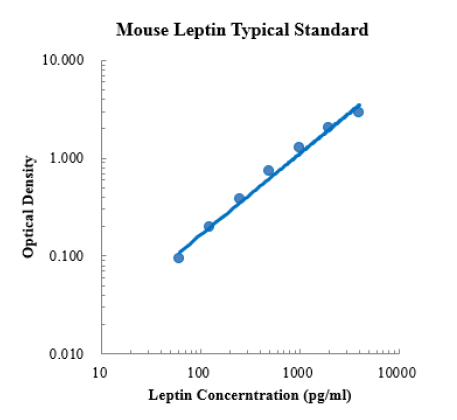- Cart 0
- English
Mouse Leptin ELISA Kit
 Request bulk quotation
Request bulk quotation- Product Details
- FAQ
- Documents
Detection Principle:
This kit uses double antibody sandwich ELISA technology. Specific Anti-Mouse Leptin Capture Antibody was precoated on a high-affinity microplate. The standard, the test sample and the biotin-labeled antibody were added into the microplate Wells in turn, and the mixture was shaken thoroughly and incubated at room temperature for 2 hours. The Leptin present in the sample was bound to the solid-phase antibody and the test antibody. After thorough washing to remove free and unbound components, the horseradish peroxidase labeled Streptavidin-HRP (SA-HRP) was added. After washing again, TMB chromogenic substrate was added and incubated at room temperature in the dark for color development. The degree of color reaction was positively correlated with the concentration of Leptin in the sample. The reaction was terminated by adding termination solution, and the absorbance value was measured by microplate reader at 450 nm detection wavelength (correction wavelength 570-630 nm).
Test Type: Double-antibody sandwich method
Form: precoated 96-well plate
Test Sample Type: Cells in supernatant, serum and plasma
Loading Volume: 100μ l
Kit Components: Precoated 96-well plate, standard, Mouse Leptin detection antibody, detection buffer, TMB color substrate, washing solution, termination solution, plate sealing membrane and one instruction manual.
Sensitivity: 2.48 pg/mL
Detection Range: 62.5-4000 pg/ml
Recovery Range: 73-120%
Preservation Method: 2-8℃
Standard Curve:

Background:
Leptin is a protein hormone secreted by adipocytes, which regulates energy balance by inhibiting hunger. In addition to white adipose tissue, leptin is also produced by brown adipose tissue, placenta, ovary, skeletal muscle, stomach, mammary epithelial cells, bone marrow and P/D1 cells. Both leptin and ghrelin act on receptors in the arcuate nucleus of the hypothalamus to regulate appetite and energy balance. The basic function of leptin is the regulation of fat storage, but it also plays a role in other physiological metabolic processes, while many other functions are not well defined. Research has linked leptin to obesity and weight loss.
